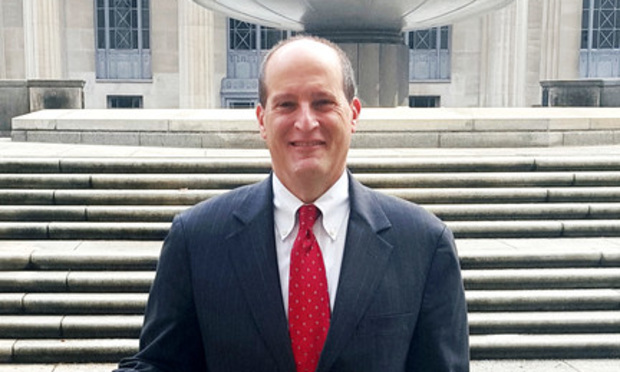'These Arguments Are Fabricated': House's Doug Letter Rips DOJ Brief Backing Trump
“The department urges this court to intrude on the U.S. House of Representatives’ exercise of its Article I power in ways that are flatly inconsistent with Supreme Court precedent,” Letter argues.
August 20, 2019 at 04:59 PM
5 minute read
 Doug Letter in Washington, D.C. Jan. 11, 2018.
Doug Letter in Washington, D.C. Jan. 11, 2018.
The House on Tuesday shot back at the Department of Justice’s filing urging a D.C. federal appeals court to strike down a congressional subpoena for President Donald Trump’s financial records, labeling the arguments at odds with U.S. Supreme Court precedent and “fabricated out of whole cloth.”
In a 27-page filing signed by House general counsel and DOJ veteran Douglas Letter, attorneys representing the House Oversight and Reform Committee were unbridled in their criticism of the DOJ brief backing the president’s arguments against the subpoena.
“Without acknowledging this history, the department urges this Court to intrude on the U.S. House of Representatives’ exercise of its Article I power in ways that are flatly inconsistent with Supreme Court precedent,” said the brief filed with the U.S. Court of Appeals for the D.C. Circuit.
The House attorneys highlighted past times the chamber requested and received documents or testimony in the course of investigations relating to the president, beginning with George Washington’s 1792 acknowledgement that the lawmakers could request information from his office.
“Presidents from George Washington on (unlike Mr. Trump) have understood that Congress has the power to conduct investigations and oversight of the president as part of the constitutional design,” the filing reads.
They took particular aim at the DOJ’s claims the subpoena should be dismissed because the House needed to “clearly authorize” the request. They also took issue with DOJ’s suggestion that the circuit panel examine whether the subpoenaed information is “important to Congress’s investigation.”
“These arguments are fabricated out of whole cloth: they may represent what the department wishes the law were, but they are not the law,” the filing said.
Letter, who spent 40 years at Main Justice, reiterated his stance that the case did not raise separation of powers issues because it was directed toward Trump’s accounting firm, Mazars, and not the president himself.
The brief further criticizes DOJ’s suggestion that the court “create a demanding test that would limit congressional investigations relating to the president” by asking lawmakers to provide a legislative purpose for the subpoena “such that courts could ‘concretely review the validity of any potential legislation’ and determine whether the information ‘is pertinent and necessary.’”
“The department cites no law supporting this novel concept because there is none,” the lawyers added.
The Justice Department publicly took sides in the subpoena fights between the House and Trump for the first time earlier this month, at the request of the D.C. Circuit panel. The judges heard oral arguments in the case last month, and at the time questioned why DOJ was not involved.
The government attorneys sided with Trump’s personal lawyers’ claims that allowing the subpoena to be enforced would create an undue burden for the president, and may be a form of law enforcement.
House Oversight and Reform Committee Chairman Elijah Cummings, D-Maryland, issued the subpoena to Mazars for Trump’s tax records as part of House Democrats’ sweeping investigations into the president.
Trump sued in his personal capacity to block the subpoena. U.S. District Judge Amit Mehta of the DIstrict of Columbia ruled earlier this year to uphold the document request, and the matter is now being weighed by Judges David Tatel, Patricia Millett and Neomi Rao of the U.S. Court of Appeals for the District of Columbia.
Trump’s attorneys at Consovoy McCarthy celebrated the Justice Department’s brief in its own response to the filing Tuesday.
“This court asked the United States whether the committee’s subpoena to Mazars for the president’s records is valid,” the Trump filing said in its opening lines. “The United States responded with a definitive no.”
The attorneys argued that past subpoenas for presidential records were issued through special congressional committees, and that the House Oversight Committee unilaterally sending the request to a third party “raises constitutional red flags.”
The brief also hinted that the matter could make its way to the U.S. Supreme Court, writing that for “this case or in the future, the Supreme Court might need to assess whether a congressional subpoena to a third party for a president’s records in and of itself violates the separation of powers.”
And it pointed to DOJ’s suggestion of potential law enforcement on the part of House Democrats as further bolstering Trump’s own arguments against the subpoena.
“If anyone knows what is and isn’t law enforcement, it’s the Department of Justice,” the filing reads.
Read more:
Trump’s Lawyers Mount New Effort to Keep DC Judge on Tax Returns Lawsuit
Judge Carl Nichols Is Assigned to Trump’s Bid to Keep NY Tax Returns Secret
Trump’s Now Suing on Both Coasts to Keep His Tax Returns Secret
Justice Dept. Lines Up Against House Democrats in Trump Subpoena Case
Trump’s Lawyers Drag Justices Into DC Circuit Subpoena Fight
This content has been archived. It is available through our partners, LexisNexis® and Bloomberg Law.
To view this content, please continue to their sites.
Not a Lexis Subscriber?
Subscribe Now
Not a Bloomberg Law Subscriber?
Subscribe Now
NOT FOR REPRINT
© 2025 ALM Global, LLC, All Rights Reserved. Request academic re-use from www.copyright.com. All other uses, submit a request to [email protected]. For more information visit Asset & Logo Licensing.
You Might Like
View All
GOP Now Holds FTC Gavel, but Dems Signal They'll Be a Rowdy Minority
6 minute read
Fired by Trump, EEOC's First Blind GC Lands at Nonprofit Targeting Abuses of Power
3 minute read
Latham Adds Former Treasury Department Lawyer for Cross-Border Deal Guidance
2 minute read
'Erroneous Rulings'?: Wilmer Asks 4th Circuit to Overturn Mosby's Criminal Convictions
3 minute readTrending Stories
- 1How I Made Partner: 'Take Every Opportunity to Get Involved in the Business Side of the Firm,' Says Alyssa Domzal of Ballard Spahr
- 2People in the News—Feb. 5, 2025—Eckert Seamans, Rawle & Henderson
- 3Librarian's Termination Violated First Amendment Protections, Lawsuit Claims
- 4Choice-of-Law Issues as the UCC 2022 Amendments Come into Effect
- 5Six Benefits of Taking an Opposing Medical Expert’s Deposition
Who Got The Work
J. Brugh Lower of Gibbons has entered an appearance for industrial equipment supplier Devco Corporation in a pending trademark infringement lawsuit. The suit, accusing the defendant of selling knock-off Graco products, was filed Dec. 18 in New Jersey District Court by Rivkin Radler on behalf of Graco Inc. and Graco Minnesota. The case, assigned to U.S. District Judge Zahid N. Quraishi, is 3:24-cv-11294, Graco Inc. et al v. Devco Corporation.
Who Got The Work
Rebecca Maller-Stein and Kent A. Yalowitz of Arnold & Porter Kaye Scholer have entered their appearances for Hanaco Venture Capital and its executives, Lior Prosor and David Frankel, in a pending securities lawsuit. The action, filed on Dec. 24 in New York Southern District Court by Zell, Aron & Co. on behalf of Goldeneye Advisors, accuses the defendants of negligently and fraudulently managing the plaintiff's $1 million investment. The case, assigned to U.S. District Judge Vernon S. Broderick, is 1:24-cv-09918, Goldeneye Advisors, LLC v. Hanaco Venture Capital, Ltd. et al.
Who Got The Work
Attorneys from A&O Shearman has stepped in as defense counsel for Toronto-Dominion Bank and other defendants in a pending securities class action. The suit, filed Dec. 11 in New York Southern District Court by Bleichmar Fonti & Auld, accuses the defendants of concealing the bank's 'pervasive' deficiencies in regards to its compliance with the Bank Secrecy Act and the quality of its anti-money laundering controls. The case, assigned to U.S. District Judge Arun Subramanian, is 1:24-cv-09445, Gonzalez v. The Toronto-Dominion Bank et al.
Who Got The Work
Crown Castle International, a Pennsylvania company providing shared communications infrastructure, has turned to Luke D. Wolf of Gordon Rees Scully Mansukhani to fend off a pending breach-of-contract lawsuit. The court action, filed Nov. 25 in Michigan Eastern District Court by Hooper Hathaway PC on behalf of The Town Residences LLC, accuses Crown Castle of failing to transfer approximately $30,000 in utility payments from T-Mobile in breach of a roof-top lease and assignment agreement. The case, assigned to U.S. District Judge Susan K. Declercq, is 2:24-cv-13131, The Town Residences LLC v. T-Mobile US, Inc. et al.
Who Got The Work
Wilfred P. Coronato and Daniel M. Schwartz of McCarter & English have stepped in as defense counsel to Electrolux Home Products Inc. in a pending product liability lawsuit. The court action, filed Nov. 26 in New York Eastern District Court by Poulos Lopiccolo PC and Nagel Rice LLP on behalf of David Stern, alleges that the defendant's refrigerators’ drawers and shelving repeatedly break and fall apart within months after purchase. The case, assigned to U.S. District Judge Joan M. Azrack, is 2:24-cv-08204, Stern v. Electrolux Home Products, Inc.
Featured Firms
Law Offices of Gary Martin Hays & Associates, P.C.
(470) 294-1674
Law Offices of Mark E. Salomone
(857) 444-6468
Smith & Hassler
(713) 739-1250








